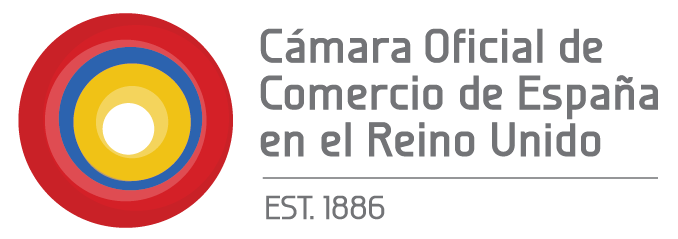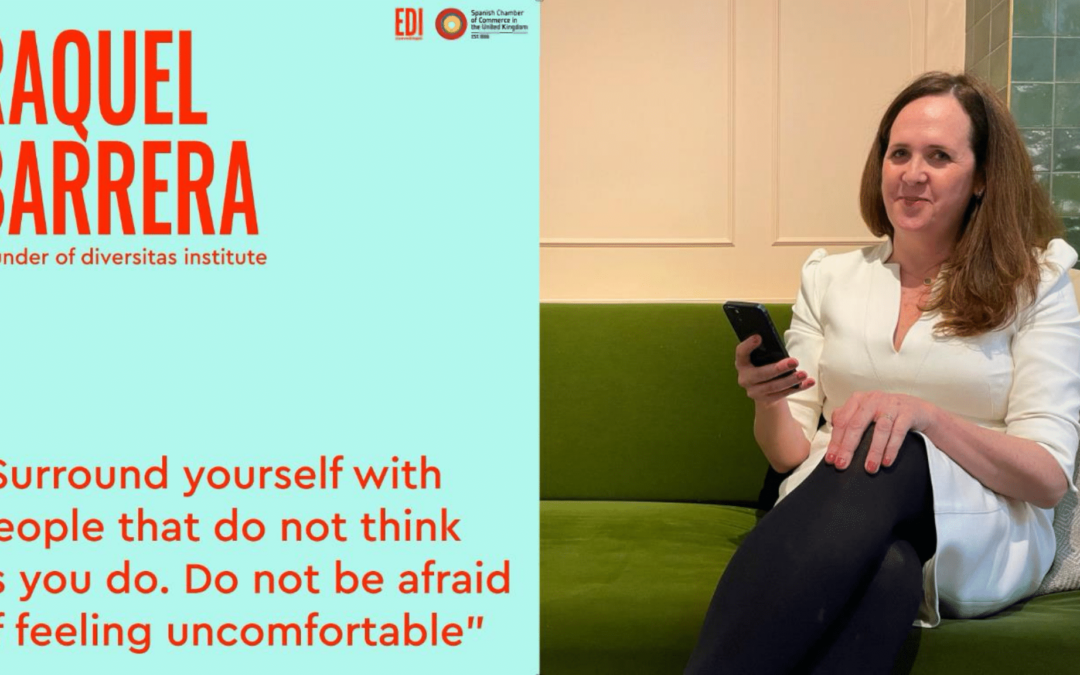Tell us a bit about yourself (company, your position in the company, experience, etc..)
My name is Raquel Barrera and I am an Equity, Diversity and Inclusion expert and founder of diversitas institute. I am also a Board member of the Spanish Chamber of Commerce in the UK. I am passionate about art, books, history and cultural life in London and I am also a strong believer in the benefits of a more equitable, diverse and inclusive world.
I lead Equity, Diversity and Inclusion (EDI) projects from a gender perspective, advocate and promote EDI in the workplace and accompany organisations from a broad variety of sectors and sizes on that journey.
From your perspective and own experience, what challenges and opportunities do you think women face in the workplace?
In terms of the challenges, from my own personal perspective and after working with many organisations from a wide variety of sectors and sizes, there are several barriers that women still face in the workplace.
The more structural challenges are, on one hand, the different perception between women and men regarding the need of changing and the challenges women face in the workplace. If we add the lack of female representation at decision-making level, we have an scenario where the speed to achieve a more equitable world is not as fast as expected.
On the other hand, there is the question of care. Women have massively joined the labour market but without completely giving up the unpaid care activities. In summary, women continue to shoulder the burden of childcare and unpaid work in the home. In addition to that, the so called motherhood penalty is a reality. Nowadays, when a woman decides to have a child, this has a great impact in her professional life.
From the organisational perspective, I identify two different challenges. One of those challenges is the “ticking-the-box” perspective. This is, probably, one of the greatest mistakes that can lead to inconsistency between expectations and reality, between what it is said and what it is done and, as a consequence, diversity fatigue and backlash.
Finally, regarding the approach, most of the time, and with the best of the intentions, we try to “fix the women’s issue” from a more traditional perspective, particularly when addressing topics such as leadership styles or work-life balance. This can create situations that can end up in a “fixing the women (and the men!) that do not fit with the traditional stereotypes” approach rather than “redefining the system or accepting different perspectives, behaviours or leadership styles”.
In term of opportunities, it is true that there is a business case associated with gender equity. However, I am a bit reluctant to use it as an argument if it is not strictly necessary because it can reinforce the idea that women need to perform really well when offered these positions. At the end of the day, it doesn’t seem unreasonable that if the world is 50% women and 50% men, the decision-making positions should have a similar percentage.
What do you think organisations should do in order to increase the presence of women in leadership positions?
I believe that it is absolutely crucial to identify and understand where the organisation is regarding gender equity. Every organisation is unique and the “one-size-fits-all” approach does not longer work. In order to avoid misconceptions and subjectivity, gathering meaningful data is key. Demographics, measure of employees perception and an analysis of the organisation’s process is a basic first step. It is not about how much data you gather but how meaningful it is. Once you know where the issues are, define ambitious but realistic goals, KPIs and specific actions. Common pitfalls include fragmented I&D initiatives, overly relying on individual commitments or the lack of a clear link with the company’s core business strategy. The key is to build a commitment from the top; identify leaders, allies and change-resistance; understand the impact of structural and systemic external issues and assess the internal processes in order to make them as biased-free as possible. The final goal is that, eventually people of talent and ability can ascend to the level they deserve, regardless of their gender.
What advice would you give to your young-self?
I would probably tell my young-self to always think twice why you think or feel the way you do, if your decisions are really free-will decisions and if there is a more creative and non-obvious way. I would also encourage myself to be surrounded with people with different views and to not be afraid of feeling uncomfortable. Finally, never underestimate the impact your actions have (no matter how small they are) and the power of change.
In terms of gender equality, how do you imagine the world in 10 years’ time? What would be your dream come true?
In 10 years’ time I hope to see a wider and richer representation in the decision-making. Ultimately, my dream would be for diversitas institute to disappear because it is no longer needed.





